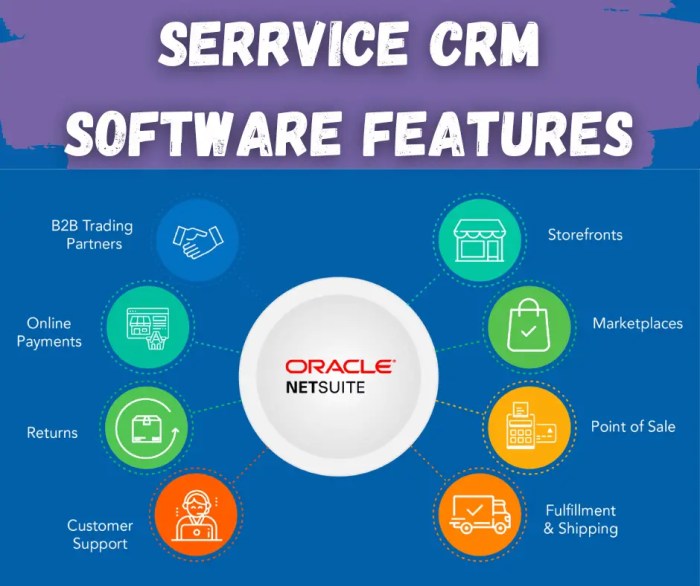Crm software and services – In today’s competitive business landscape, managing customer relationships effectively is paramount to success. Customer Relationship Management (CRM) software and services provide the tools and infrastructure to streamline these interactions, fostering stronger customer bonds and driving business growth. This comprehensive guide delves into the world of CRM, exploring its features, benefits, types, and considerations for choosing the right solution for your business needs.
Understanding CRM Software and Services
CRM software acts as a central hub for all customer-related information. It consolidates data from various sources, providing a unified view of each customer’s interactions with your business. This includes contact details, purchase history, communication logs, support tickets, and more. CRM services extend this functionality, often incorporating features like cloud hosting, data analytics, and integration with other business applications.
This allows businesses of all sizes to leverage the power of CRM without the burden of extensive IT infrastructure.
Key Features of CRM Software, Crm software and services
- Contact Management: Organize and manage customer contact information, including names, addresses, phone numbers, email addresses, and social media profiles.
- Sales Force Automation (SFA): Automate sales processes, track leads, manage opportunities, and forecast sales revenue. This often includes features like pipeline management and sales forecasting tools.
- Marketing Automation: Automate marketing campaigns, personalize customer communications, and track marketing ROI. This includes email marketing, social media marketing, and campaign management tools.
- Customer Service and Support: Manage customer inquiries, track support tickets, and resolve issues efficiently. This often integrates with help desk software and live chat functionalities.
- Reporting and Analytics: Gain valuable insights into customer behavior, sales performance, and marketing effectiveness through comprehensive reporting and analytics dashboards. This allows for data-driven decision-making.
- Integration Capabilities: Seamlessly integrate with other business applications, such as email marketing platforms, e-commerce systems, and accounting software. This ensures data consistency and efficiency.
Types of CRM Software
CRM systems are categorized into several types based on their deployment and functionality:
1. On-Premise CRM
On-premise CRM software is installed and maintained on the company’s own servers. This offers greater control over data security and customization but requires significant upfront investment in hardware and IT infrastructure. It is often chosen by large enterprises with specific security requirements.
2. Cloud-Based CRM (SaaS)
Cloud-based CRM, also known as Software as a Service (SaaS), is hosted on the vendor’s servers and accessed via the internet. This eliminates the need for on-site infrastructure, reduces IT costs, and offers scalability and accessibility. It is popular among small and medium-sized businesses (SMBs) due to its affordability and ease of use. Examples include Salesforce, HubSpot, and Zoho CRM.
3. Mobile CRM
Mobile CRM allows access to customer data and functionalities through mobile devices (smartphones and tablets). This enables sales teams and customer service representatives to work remotely and stay connected with customers on the go. Most modern CRM systems offer mobile accessibility.
4. Operational CRM
Operational CRM focuses on automating and improving business processes related to sales, marketing, and customer service. It aims to streamline workflows and enhance efficiency.
5. Analytical CRM
Analytical CRM uses data analysis to gain insights into customer behavior and preferences. This information is used to improve marketing campaigns, personalize customer experiences, and make data-driven business decisions. This often involves using business intelligence (BI) tools.
Benefits of Implementing CRM Software: Crm Software And Services
Implementing a CRM system offers numerous benefits for businesses of all sizes:
- Improved Customer Relationships: Personalized interactions and better understanding of customer needs lead to stronger customer loyalty.
- Increased Sales Revenue: Streamlined sales processes, better lead management, and improved sales forecasting contribute to higher revenue.
- Enhanced Customer Service: Faster response times, efficient issue resolution, and improved customer satisfaction lead to increased customer retention.
- Improved Marketing ROI: Targeted marketing campaigns and data-driven decision-making optimize marketing spend and maximize ROI.
- Better Collaboration: Centralized data and improved communication enhance teamwork and collaboration across departments.
- Data-Driven Decision Making: Access to real-time data and comprehensive reporting enables informed business decisions.
- Increased Efficiency and Productivity: Automation of tasks and streamlined processes free up time for more strategic initiatives.
Choosing the Right CRM Software
Selecting the appropriate CRM software requires careful consideration of several factors:
- Business Size and Needs: Small businesses may require simpler, more affordable solutions, while larger enterprises may need more robust and scalable systems.
- Budget: Consider the cost of the software, implementation, and ongoing maintenance.
- Integration with Existing Systems: Ensure compatibility with your existing business applications, such as email marketing platforms and accounting software.
- Scalability: Choose a system that can grow with your business and accommodate future needs.
- Ease of Use: Select a user-friendly system that is easy for your employees to learn and use.
- Customer Support: Ensure the vendor offers adequate customer support and training.
Frequently Asked Questions (FAQ)
- Q: What is the cost of CRM software? A: The cost varies widely depending on the vendor, features, and number of users. Some offer free plans with limited functionality, while others charge monthly or annual subscriptions based on usage.
- Q: How long does it take to implement CRM software? A: Implementation time depends on the complexity of the system and the size of your business. It can range from a few weeks to several months.
- Q: What are the best CRM software options? A: Popular options include Salesforce, HubSpot, Zoho CRM, Microsoft Dynamics 365, and Pipedrive. The best choice depends on your specific needs and budget.
- Q: Can I integrate my CRM with other software? A: Most CRM systems offer integration capabilities with other business applications through APIs or pre-built connectors.
- Q: What are the key metrics to track in CRM? A: Key metrics include customer acquisition cost (CAC), customer lifetime value (CLTV), customer churn rate, and sales conversion rate.
Conclusion
CRM software and services are essential tools for businesses seeking to improve customer relationships, streamline operations, and drive growth. By carefully considering your business needs and choosing the right solution, you can unlock the full potential of your customer data and build lasting relationships with your customers. Start exploring CRM options today and transform your business.
References
Call to Action
Ready to elevate your customer relationships and drive business growth? Contact us today for a free consultation to discuss your CRM needs and find the perfect solution for your business!
FAQs
What are the different types of CRM software?
CRM software comes in various forms, including operational CRM (automating tasks), analytical CRM (analyzing customer data), and collaborative CRM (improving team communication). There are also cloud-based, on-premise, and hybrid options.
How much does CRM software cost?
The cost of CRM software varies greatly depending on the features, scale, and vendor. Pricing models range from subscription-based fees to one-time purchases, with costs potentially influenced by the number of users and required integrations.

Source: sutisoft.com
How long does it take to implement CRM software?

Source: myprogrammingschool.com
Implementation timelines vary depending on the complexity of the system and the size of the organization. Smaller implementations might take weeks, while larger ones could take months or even longer.
What are the key features to look for in CRM software?
Essential features include contact management, sales force automation, marketing automation, customer service tools, reporting and analytics, and integration capabilities with other business applications.
